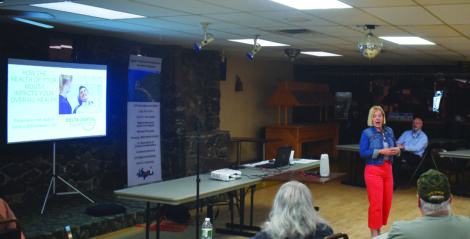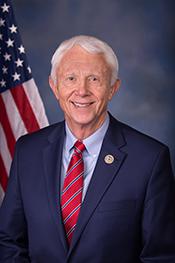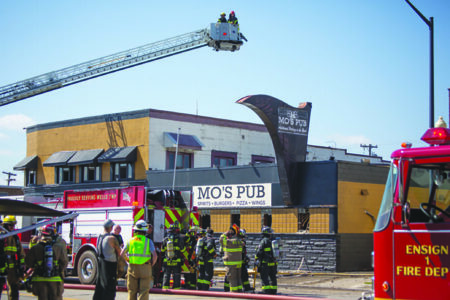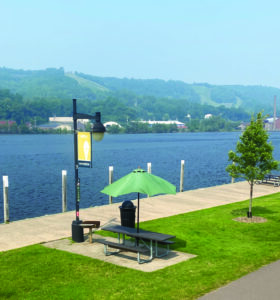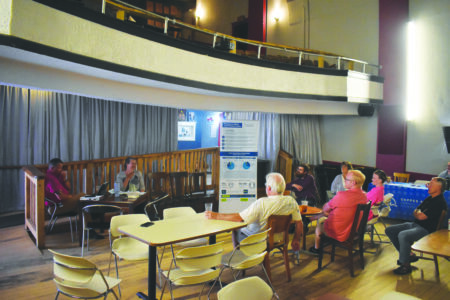A real problem: Vets dental health
Forum looks at serious issue
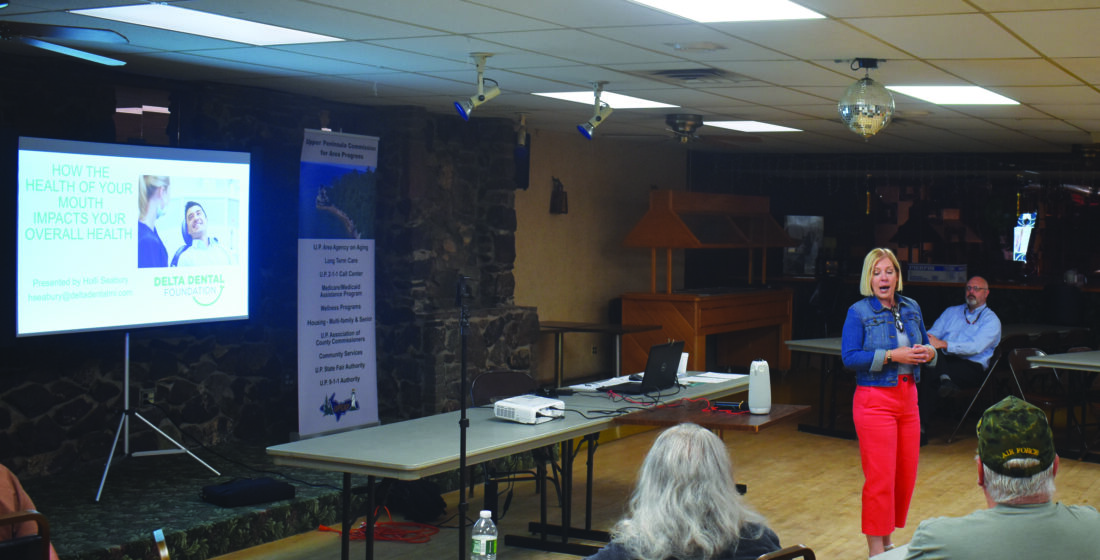
Ben Garbacz/Daily Mining Gazette Holli Seabury reviewed several health issues which can stem from or worsen because of poor oral health at the rural veteran health forum at the South Range VFW Auxiliary Post 6165. She also shared options veterans can explore when looking for dental care.
SOUTH RANGE — The Upper Peninsula Commission for Area Progress (UPCAP) held a rural veteran health forum at South Range VFW Auxiliary Post 6165. Veterans were invited to learn of available dental resources and to share their experiences regarding struggles to obtain dental care in the U.P. The forum included presentations and question and answer sessions from UPCAP Veteran Program Manager Frank Lombard, Michigan Department of Health and Human Services Rural Oral Health Consultant Emily Norrix and Exectutive Director at Delta Dental Foundation Holli Seabury.
Lombard began the forum sharing statistics and facts along with personal accounts from veterans regarding their struggle with dental issues. He said UPCAP sent out an overall needs assessment to determine what resources veterans needed. Lombard said the top two needs were home repairs and dental care. When dental came up as the second largest need, he said UPCAP wanted to understand why the need was so high. “As we dug into it a little bit more, we recognized this wasn’t an isolated incident,” Lombard said. “It wasn’t just an issue with one particular town or county.”
Lombard said UPCAP did recognize the only veterans who qualify for dental coverage consistently through the VA are those rated at the 100 percent service-connected disabled level. “If you’re below 100 percent service connected, you don’t qualify for dental except if you are homeless and actually using a HUD-VASH voucher, which sometimes requires you to be in a homeless program for a period of time before they can get you lined up with that. There are also clauses where if somebody had an injury while they were in the service and their teeth were injured, they’ll be able to get dental care for those particular issues,” Lombard said.
After the presentation, Lombard said the VA disability claims are through the Veteran Benefits Administration, which is separate from the Healthcare Administration. “If somebody files a claim through the VA benefits administration, and that claim is awarded and approved, and it’s determined that that veteran meets the requirement for a 100 percent service connected disability rating,” he said.
Lombard added the Veterans Benefit Administration utilizes evidence through the Veterans Healthcare Administration and other non VA healthcare records to evaluate and come to a decision on the disability rating. Other factors that can come into the decision include testimonies from veterans’ spouses, fellow veterans they served with and military documentation. The disability rating is not fixed. A veteran’s health condition will change the disability rating whether the veteran’s health becomes better, leveled out or worse.
“There’s various dynamics around that 100 percent service connected rating, but the very important thing to recognize is that that isn’t necessarily a permanent situation,” Lombard said. “They still have to continue to engage with their VA healthcare and seek treatment for whatever that condition is and it can be a battle, sometimes a lifelong battle, for many veterans to actually finally reach that 100 percent service connected level.”
Lombard said there’s a small number of veterans who receive 100 percent service connected disability, which leaves few eligible for dental through the VA. Another problem that was brought up was the fact many 100 percent disability veterans are unaware they will be covered. Lombard shared he knew a retired colonel who was 100 percent disabled six years in a row and was paying for dental out of his own pocket during those years.
A breakdown of 100 percent veteran disability was made across the U.P.’s counties, and Baraga County held the highest number at 10.62 percent. UPCAP also reached out to service providers and used a grant from Carequest Institute for Oral Health which provided $125,000 for data collection. UPCAP collected 833 unduplicated surveys of 850 total responses. The surveys revealed a struggle in finding dentists in general but also dentists who accept certain insurance and the VA network. Dentists who spoke with Lombard said payment and payment delays are a problem.
“I’ve spoken with some dentists, and they said they’ll submit a claim, or they’ll submit the bill, and they’re not getting what they’re asking for, and as a brick and mortar private run dental clinic, it’s hard for them to keep their doors open in order to do that,” Lombard said.
The survey also revealed 33 veterans resorted to pulling their own teeth due to the inability to access dental care. “There shouldn’t be one veteran answering yes to that question, but because of the lack of providers available and the lack of coverage, this is what they had to resort to. And in speaking with a dentist at the Ironwood Veteran Oral Health forum yesterday, they did mention sometimes for certain veterans, when their dental health has deteriorated so much it’s not very hard to pull that tooth out. That’s very sad,” Lombard said.
Norrix shared statistics of veterans in the U.P., which showed Ontonagon County had the highest veteran population per capita in Michigan. Over 10 percent of veterans in rural counties do not have teeth anymore, 15 percent have heart disease and 20 percent have diabetes. The U.P. has a shortage of dentists and Norrix said it is in need of 300 additional dentists to meet the needs of the region. There is also a need for registered dental hygienists and dental assistants. Time it takes for an appointment made at federally qualified health centers sometimes take up to a year and a half to be seen.
“So at the state level, there is no quick fix to this,” Norrix said. “I’ll be honest, this is something that’s going to take years to conquer and lots of small things to add up to a solution. But one of the things we’re looking at is trying to support educational programs in the Upper Peninsula to start having dental type training, things like for hygienists and dental assistance.”
The goal would be to keep residents local without having to travel long distance to obtain a dental career utilized in the U.P. Norrix recommended the attendees to encourage people who are career searching to consider dental jobs. “If you know someone who’s looking to get their foot in the door in a medical career or interested in dentistry, there are multiple programs in the Upper Peninsula which will train you to be a dental assistant on site and pay you while you train your work. It’s a great deal. I think upper Great Lakes is one of those, and that’s close,” she said.
Norrix emphasized the importance of making dental appointments that have been scheduled due to the health consequences of poor oral health and the difficulty of finding appointments. Seabury shared a statistic which revealed only about 15 percent of veterans qualify for dental care through the VA. She then proceeded to go over some of the health issues which can be linked to oral health. Infections or injuries to teeth or gums can be hazardous to overall health due to blood flow spreading bacteria from the mouth to the rest of the body.
“For instance, if you get something injected into you, into your blood system, your heart beating, takes about seven seconds to put it throughout your entire body,” Seabury said. “This means that that infection in your gum and your teeth is throughout your entire body.”
Bacteria present with individuals with gum disease can contribute to things such as heart attacks and strokes as well as hinder the health further of those with diabetes. There is also a gum linked condition known as endocarditis which can be fatal. Bacteria which are breathed in when people inhale gets carried to the lungs, which can lead to illnesses like pneumonia. Seabury also shared there has been a discovery of bacteria from gum disease found in the brains of people with Alzheimer’s. This is why it is important to have their regular dentist appointments and keep up with mouth hygiene.
Seabury then explained some of the options of acquiring dental coverage. She said some employers offer Delta Dental and if that was not an option, Medicar Advantage plans depending on income levels may be available. However Medicare does not provide dental. Medicaid provides dental coverage, though Seabury said only about 30 percent of dentists accept it.
When it came to veterans telling their dental stories, one veteran shared he had difficulty finding a dentist because the ones he contacted were not accepting any new patients. He had to have work done on his teeth which turned into an emergency which cost a higher expense. His dental policy he was under allowed $3,500 per year for coverage, but his emergency procedure took the entirety of that money. He will now have to wait for a year to have funds to use for dental care.
Lombard emphasized the most important thing to happen in order to help the accessibility of dental care for veterans is for veterans to share their stories and reach out to groups such as UPCAP to record their testimonies to combine with the survey data UPCAP has collected.
“We want to get those actual personal stories, either video, audio, recorded quotes in print that we can use to present to policy makers and legislators. We really need veterans to share their story, because those stories carry a lot of weight, and sometimes much more weight than a graph can communicate,” Lombard said.

